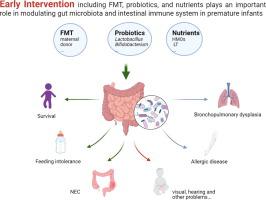Journal of Advanced Research ( IF 10.7 ) Pub Date : 2022-11-11 , DOI: 10.1016/j.jare.2022.11.004 Quanhang Xiang 1 , Xudong Yan 2 , Wei Shi 3 , Huiping Li 4 , Kai Zhou 5

|
Background
Preterm birth is the leading cause of death in children under the age of five. One of the major factors contributing to the high risk of diseases and deaths in premature infants is the incomplete development of the intestinal immune system. The gut microbiota has been widely recognized as a critical factor in promoting the development and function of the intestinal immune system after birth. However, the gut microbiota of premature infants is at high risk of dysbiosis, which is highly associated with adverse effects on the development and education of the early life immune system. Early intervention can modulate the colonization and development of gut microbiota and has a long-term influence on the development of the intestinal immune system.
Aim of Review
This review aims to summarize the characterization, interconnection, and underlying mechanism of gut microbiota and intestinal innate immunity in premature infants, and to discuss the status, applicability, safety, and prospects of different intervention strategies in premature infants, thus providing an overview and outlook of the current applications and remaining gaps of early intervention strategies in premature infants.
Key Scientific Concepts of Review
This review is focused on three key concepts. Firstly, the gut microbiota of premature infants is at high risk of dysbiosis, resulting in dysfunctional intestinal immune system processes. Secondly, contributing roles of early intervention have been observed in improving the intestinal environment and promoting gut microbiota colonization, which is significant in the development and function of gut immunity in premature infants. Thirdly, different strategies of early intervention, such as probiotics, fecal microbiota transplantation, and nutrients, show different safety, applicability, and outcome in premature infants, and the underlying mechanism is complex and poorly understood.
中文翻译:

早产儿早期肠道菌群干预:应用前景
背景
早产是五岁以下儿童死亡的主要原因。导致早产儿疾病和死亡高风险的主要因素之一是肠道免疫系统发育不完全。肠道微生物群被广泛认为是促进出生后肠道免疫系统发育和功能的关键因素。然而,早产儿的肠道微生物群存在菌群失调的高风险,这与对生命早期免疫系统的发育和教育的不利影响密切相关。早期干预可以调节肠道微生物群的定植和发育,并对肠道免疫系统的发育产生长期影响。
审查目的
本文旨在总结早产儿肠道菌群和肠道先天免疫的特征、相互关系和潜在机制,并讨论早产儿不同干预策略的现状、适用性、安全性和前景,从而提供概述和展望早产儿早期干预策略的当前应用和仍然存在的差距。
审查的关键科学概念
本次审查重点关注三个关键概念。首先,早产儿的肠道微生物群处于菌群失调的高风险,导致肠道免疫系统过程功能失调。其次,早期干预在改善肠道环境和促进肠道菌群定植方面发挥着重要作用,这对早产儿肠道免疫的发育和功能具有重要意义。第三,不同的早期干预策略,如益生菌、粪便微生物群移植和营养物质,在早产儿中表现出不同的安全性、适用性和结果,且其潜在机制复杂且知之甚少。



























 京公网安备 11010802027423号
京公网安备 11010802027423号